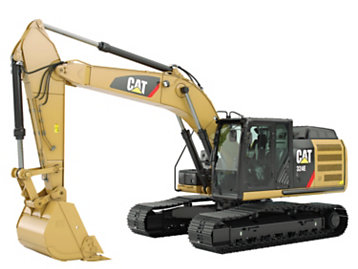Senate Misses the Boat - US High Taxes force Businesses to Move to Other Countries.

(see Cat.com)
Once again, Congress is focusing on businesses that have used smart planning in order to avoid the excessive US corporate and personal tax rates as well as the extremely complex compliance costs. Instead of focusing on how to lower US taxes and make tax compliance easier and less expensive, the US Senate is now picking on Caterpillar as a so-called "tax dodge".
The US has extremely high corporate tax rates of 35%. This means if a corporation makes a $100 profit, it pays $35 federal tax (plus State tax which could be 10% or higher). The remaining money when distributed to the shareholders gets taxed again at the shareholders rate which could be up to 39 1/2% plus State tax. So for example $100 of earnings would be $35 of federal tax, $10 of State tax leaving $55. The $55 would be taxed at the individual level with a combined federal and State tax of approximately 50% yielding about $28 on an earnings of $100. No wonder businesses are trying to do everything possible to avoid this horrible tax scenario.
On top of it, there is the high cost of IRS audits. Unlike individuals and small businesses where audits, although painful, can be contained, large businesses suffer year in and year out audits that end up costing them large dollars and in internal staffed to prove that their tax return is correct. In addition they have to pay tax attorneys and accountants and other professionals.
This convergence of high tax cost and high compliance court's has resulted in the US being uncompetitive. No matter what studies Congress will try to show to prove whatever they want, the fact is major corporations are moving intellectual property outside of the US primarily for tax reasons and compliance reasons. We are world economy and Congress needs to recognize this.
See Reuters Article:
Caterpillar's Swiss unit dodged $2.4 bln of U.S. taxes -Senate panel
By Patrick Temple-West and James KelleherWASHINGTON (Reuters) - Caterpillar Inc avoided paying $2.4 billion in U.S. taxes from 2000 through 2012 by moving profits from sales of replacement parts through a low-tax unit it set up in Switzerland, a congressional panel said on Monday.
In the latest example of a major U.S. corporation's offshore tax strategies going under the congressional microscope, the Senate Permanent Subcommittee on Investigations issued a report focused on a complex 1999 restructuring by Caterpillar. The world's largest mining and construction equipment maker's restructuring negotiated a low tax rate with Switzerland for a unit it set up there to book taxable profits from sales of Caterpillar-branded replacement parts made by third parties under contract with the Peoria, Illinois-based company.
"This is a prime example of a tax avoidance strategy, whichis costing the U.S. Treasury billions of dollars," said Senator Carl Levin, the Democratic chairman of the subcommittee, which has a hearing scheduled for Tuesday on the report's findings. Caterpillar makes no replacement parts and has no warehouses in Switzerland, but 85 percent of its parts business's profits went through the Swiss unit, where the company pays a tax rate of between 4 percent and 6 percent, the subcommittee said. The top U.S. corporate tax income rate is 35 percent.
Caterpillar's Swiss structure continues to save the company about $300 million a year in U.S. taxes, the subcommittee said. In a response to the Levin report, Caterpillar said its Swiss unit, known as Caterpillar Sarl, or CSARL, has a large marketing and sales presence in Geneva, Switzerland. "CSARL is no mere shell, but rather a major operating company employing hundreds of personnel in Geneva," said Julie Lagacy, vice president of Caterpillar's finance services division, according to prepared testimony released ahead of the hearing.
Along with three Caterpillar executives, representatives of Big Four accounting firm PricewaterhouseCoopers LLP (PwC), which advised Caterpillar on the restructuring, are expected to testify. A spokeswoman for PwC defended the firm’s tax advice to Caterpillar. "We stand by the work we did for them," the spokeswoman said in a statement. Levin's panel has also held hearings on the tax strategies of Apple Inc, Hewlett-Packard Co and MicrosoftCorp. "This (Caterpillar) investigation demonstrates just how shifting profits to a tax haven is not just the province of high-tech companies," Levin said.